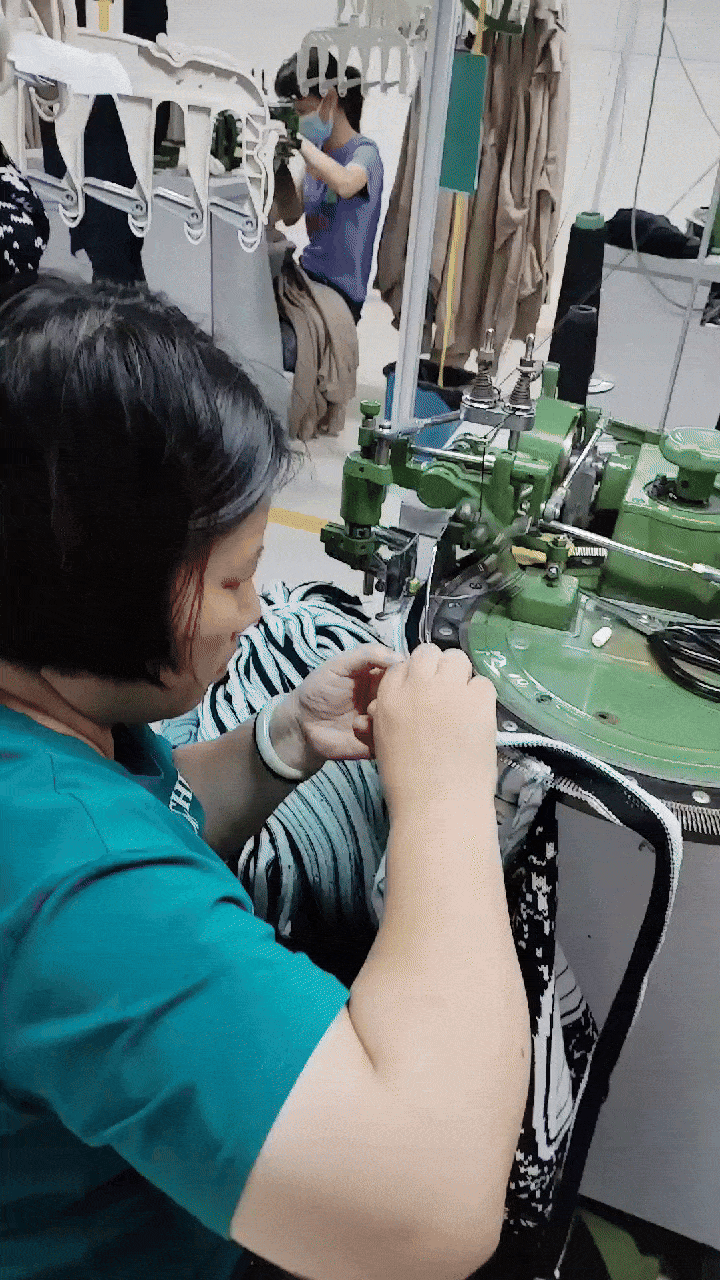Impact

Manufacturing
At Coco Clem, we believe that how we make things, and who we partner with, is just as important as what we make.
All of our manufacturing partners are based in Guangdong, China. Our jewelry is made with a Responsible Jewellry Council certified manufacturer, and our knitwear is made in partnership with a WRAP Gold certified factory. Our guidelines lay out the fundamental requirements that all factories we work with must meet before they can be accepted as business partners in accordance with accepted international standards.
The guidelines of our manufacturing practices are intended as a framework to encourage transparency and responsible production, however we believe that sustainability is not a destination, but a practice. We are always open to adapting and evolving our materials and methods if it leads to a more thoughtful outcome.
Our Commitment

Legal and Ethical Standards
We only work with manufacturers that function in full legal compliance, including business license, national and local labor law compliance, and verifiable and open employment policies. All workers must be employed voluntarily, retain control of their personal documents, and receive clear terms of employment through legal hiring processes. Traceable operations are required at every facility we work with.
Wages, Benefits, Working Hours & Recordkeeping
All suppliers must comply with all laws pertaining to local wage standards, overtime pay, and legally mandated benefits. We require accurate time and payroll record keeping, and all wages are paid through traceable, documented systems. Employees receive legally required social insurance coverage, including pension, medical, and unemployment benefits, depending on regional mandates. All facilities observe China’s national holidays, including Chinese New Year, Labor Day, National Day, and other legally recognized festivals, and take the weekends off.
Health and Safety
All suppliers must ensure that employees are provided with a safe and healthy work environment and are not exposed to unsanitary or hazardous conditions. Suppliers will comply with all applicable laws in all countries where they operate regarding health and safety, sanitation, and emergency preparedness. Workers are given proper protective equipment and all plant facilities have fire exits, sanitary facilities and emergency signage.
Environment
All suppliers must comply with all applicable environmental regulations, particularly relating to the use of the identification and security of chemicals. Each facility must maintain documented systems relating to waste management and pollution prevention to ensure that no banned or hazardous substances are being used including containment, good disposal practices, and full compliance with national environmental legislation.
We expect every partner to operate with care for their environmental impact and to demonstrate a commitment to continuous improvement in sustainability practices.
No Child Labor
No supplier may employ anyone who is younger than 15, or the legal minimum working age in the country, whichever is greater. Young workers under the age of 18 must not be subjected to hazardous, unsafe or unhealthy working conditions or materials. Adequate safeguards must exist for the protection of any young workers employed. All our manufacturing partners have verified that their employees are all above the legal minimum working age, with documentation verifiable. The youngest worker employed currently within our factories is 19.
No Forced or Bonded Labor
Suppliers must not use involuntary or forced labor, prison, indentured, bonded labor, or labor obtained through slavery or human trafficking. Suppliers are responsible for monitoring any third parties involved in employee recruitment or hiring procedures to assure that no individual is compelled to work through force, deception, intimidation, coercion or by punishment for their beliefs. Workers must not be required to lodge deposits or surrender identification documents when beginning employment.
Freedom of Association & Collective Bargaining
All suppliers have the right to organize, to join organizations of their own choosing, and to seek improved conditions without the fear of retaliation. They have the right to elect their own agents, free from interference on the part of management. We support every worker’s right to participate in collective dialogue and decision-making.
No Discrimination
Our suppliers may not discriminate against employees at any stage of employment, including hiring, wages, promotion, or termination. Discrimination based on gender, age, race, religion, disability, sexual orientation, political opinion, or other protected characteristics is not permitted.
No Harassment or Violence
We require that all employees of our suppliers are treated with dignity and respect. Physical, verbal, sexual, and psychological harassment or abuse is strictly prohibited. Factories are prohibited from using financial penalties or punishment such as coercion, fines, and/or retaliation as a means of discipline or control over employees.
No Subcontracting
All manufacturing must be carried out at a verified, disclosed facility. No sub-contracting is allowed unless prior approval is given, and any sub-contractors must comply with the same social and environmental regulations included here. We require total transparency as to where and how our products are produced, and do not allow any movement of work outside our authorized facility at any stage of production.
Traceability and Material Sourcing
We prioritize the use of independently certified materials whenever possible, including:
• U.S. Cotton Trust Protocol® (USCTP) cotton
• GOTS-certified and OCS 100 organic cotton on select styles
• GRS-certified recycled fibers
• OEKO-TEX® Standard 100 textiles, trims, and hardware
• FSC-certified paper packaging
• OK compost HOME and INDUSTRIAL-certified garment bags and apparel mailers by TÜV Austria
• OK biobased-certified mushroom leather by TÜV Austria
Customs & Security
All partner facilities maintain secure, legally compliant export processes and cooperate with customs regulations to ensure transparent, tamper-free shipment of goods.

Packaging
We choose packaging with circularity in mind. Our goal is to keep materials reused when possible, out of landfills, and ecosystems. We use materials that are compostable, recyclable or reusable and outline the benefits and limitations of each in our “How to Dispose” section below.
How to Dispose
Apparel Packaging
Both our garment bags and apparel mailers are made from a compostable blend of PLA + PBAT, certified OK compost HOME and INDUSTRIAL by TÜV Austria. If you do compost at home, the mailer and bag can go in your compost bin and will break down into non-toxic organic matter. If you don’t have a compost bin at home, you can take the mailer and bag to your nearest industrial compost facility. These bags are not recyclable and will not break down in landfill properly.
Landfills are sealed, low-oxygen environments designed for the disposal of waste long-term, not for breaking anything down into constituent parts; even compostable matter can take years to break down in such circumstances without the right conditions. We chose this material because it provides a plastic-free alternative that returns to the earth in a clean way, breaking down into CO₂, water and biomass which increase soil health when disposed of correctly rather than just disappearing.
Don't have a compost at home? Find an industrial compost facility near you.
Jewelry Packaging
Our mailers are 100% recycled, made from Forest Stewardship Council (FSC) certified recycled kraft paper. This protective and plastic free alternative to bubble mailers has a built in honeycomb padding to keep your jewelry safe in transit without the need for additional foam or plastic.
Recycle these mailers curbside with your other paper goods, or compost at home where they will naturally break down in the environment, leaving no microplastics behind. They should not be thrown in the trash where they will mostly likely end up in a landfill and cannot be broken down properly by nature, and may let off methane gas into the environment.
Don't have a compost at home? Find an industrial compost facility near you.
